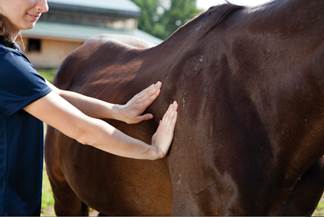Underweight Horse

By: Dr. Lydia Gray
What is it?
An underweight horse is one that scores a 4 or less on the Henneke Body Condition Scoring Scale which ranges from 1 = emaciated to 9 = obese. There are many medical reasons why a horse may be thin, including parasites, dental disease, GI conditions, infections and others. But there are also many non-medical reasons for a horse to have difficulty keeping weight on, such as breed, age, use and the environment in which he lives.
What can be done about it?
The first step is having the horse examined by a veterinarian to determine if weight loss is due to a medical condition. If not, then other reasons why the horse might be thin should be investigated. For example, a thoroughbred with a high metabolism or nervous nature might simply need more calories than the same size quarter horse living in the next stall. An older horse might require more protein to maintain muscle along his topline. A three-day eventer or barrel racer might thrive when fat is added as a fuel source. And a horse living outside with a herd may gain weight when brought in for shelter and separate feeding.
If all other factors are properly managed, and your horse still needs to gain weight, you may want to consider adding a weight gain supplement that is specifically designed for the hard keeper. Weight gain supplements provide extra calories from fat, and some also include protein for lean muscle, as well as digestive support.
What else do I need to know?
At least once a month, estimate and record both the horse's Body Condition Score and body weight, measured with a weight tape. Make sure the horse is receiving 2% of his body weight each day in forage (hay or grass) and that his diet is complete and balanced by including a fortified grain, ration balancer or multi-vitamin/mineral supplement. If more nutrition is needed, amino acids, fat and digestive support such as pre- and probiotics and enzymes can be added. Finally, consider using a daily dewormer which has been shown to increase nutrient utilization.
SmartPak strongly encourages you to consult your veterinarian regarding specific questions about your horse's health. This information is not intended to diagnose or treat any disease, and is purely educational.